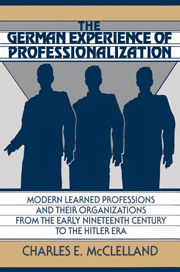 The German Experience of Professionalization
The German Experience of Professionalization Book contents
- Frontmatter
- Contents
- Acknowledgments
- Abbreviations
- Part I The problem of professions in Germany
- Part II The transition to modern professions in the early nineteenth century
- Part III Unified professions in a unified Germany?
- Part IV Breakthroughs and breakdowns: The professions enter the era of cartels and unions
- 8 The “free” professions, 1900–1918
- 9 Law-based professions, 1900–1918
- Part V The Weimar era
- Part VI The fate of professions under and after fascism
- A word about sources
- Index
9 - Law-based professions, 1900–1918
Published online by Cambridge University Press: 06 July 2010
- Frontmatter
- Contents
- Acknowledgments
- Abbreviations
- Part I The problem of professions in Germany
- Part II The transition to modern professions in the early nineteenth century
- Part III Unified professions in a unified Germany?
- Part IV Breakthroughs and breakdowns: The professions enter the era of cartels and unions
- 8 The “free” professions, 1900–1918
- 9 Law-based professions, 1900–1918
- Part V The Weimar era
- Part VI The fate of professions under and after fascism
- A word about sources
- Index
Summary
As we saw in Chapter 8, the situation of such “free professions” as medicine, dentistry, chemistry, and engineering altered perceptibly with changes in the market for services, itself conditioned by such factors as demography, the rise of large-scale business, and social insurance legislation. The “freedom” of the “free professions,” originally conceived in the liberal thought patterns of the 1860s and 1870s as liberation from bureaucratic control, appeared to take on a different meaning in the face of unequal “clienteles” such as large industry or the health-insurance funds. Words and sometimes behavior mimetic of organized proletarian labor appeared among the otherwise genteel professional organizations. The usually staid journal of the German Medical Association admonished its members in 1900 with words echoing the Communist Manifesto: “Physicians of Germany, unite! Organize yourselves! ‘Si vis pacem para helium’ [If you desire peace, prepare for war] is also valid for us.” Yet, it was not class warfare or the overthrow of the system that such groups preached and sought; instead they wished to use labor union and cartel techniques to strengthen their own bargaining position so as then to enter into a stable and equal partnership with the representatives of their “clients.” In these struggles the state bureaucracy and legislature served more as tactical allies, at least incipiently, than as instigators of their own original programs of professionalization “from above.”
Many of these generalizations hold true of the remaining professional groups in the period of 1900–18.
- Type
- Chapter
- Information
- The German Experience of ProfessionalizationModern Learned Professions and their Organizations from the Early Nineteenth Century to the Hitler Era, pp. 153 - 172Publisher: Cambridge University PressPrint publication year: 1991
